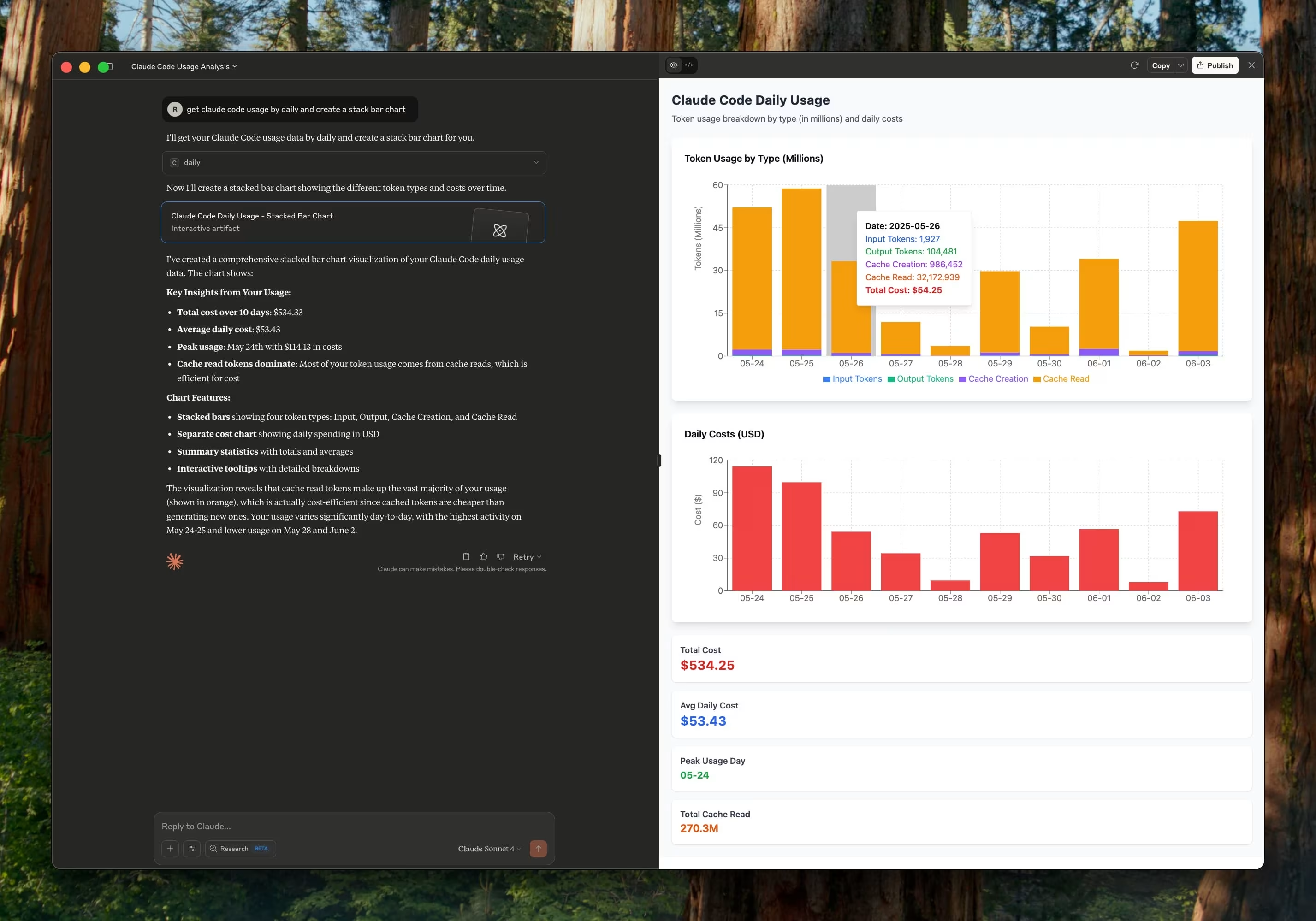MCP Server
The ccusage MCP server now lives in the dedicated @ccusage/mcp package. This keeps the main CLI lightweight while still giving you full access to MCP tools for daily, session, monthly, and billing-block analytics.
Running the MCP CLI
Execute the MCP CLI directly without installation using bunx or npx:
bunx @ccusage/mcp@latest --help
# or
npx @ccusage/mcp@latest --helpAll examples below use bunx @ccusage/mcp@latest (you can substitute with npx @ccusage/mcp@latest if preferred).
Starting the MCP Server
stdio transport (default)
bunx @ccusage/mcp@latest
# equivalent:
bunx @ccusage/mcp@latest --type stdioThe stdio transport is ideal when the MCP client spawns the process directly (for example, Claude Desktop on the same machine).
HTTP Stream Transport
bunx @ccusage/mcp@latest --type http --port 8080HTTP mode is useful when you need to expose the server to other hosts or run it as a background service.
Cost Calculation Mode
Control how costs are calculated when generating reports:
# Use cached costUSD values when present, otherwise calculate from tokens (default)
bunx @ccusage/mcp@latest --mode auto
# Always calculate from tokens using LiteLLM pricing data
bunx @ccusage/mcp@latest --mode calculate
# Only use pre-calculated costUSD values and default to 0 when missing
bunx @ccusage/mcp@latest --mode displayAll options from the original command remain available, including CLAUDE_CONFIG_DIR for custom data locations.
Available MCP Tools
The server still provides four tools with the same schemas as before:
- daily – aggregated usage per day
- monthly – aggregated usage per month
- session – grouped by Claude session ID / project directory
- blocks – 5-hour billing block summaries
Each tool accepts since, until, and mode parameters, plus timezone/locale overrides identical to the ccusage library.
Testing the MCP Server
With MCP Inspector
bunx @modelcontextprotocol/inspector bunx @ccusage/mcp@latest
# or
npx @modelcontextprotocol/inspector npx @ccusage/mcp@latestThe Inspector lets you:
- Call each tool interactively
- Inspect the tool schemas and responses
- Debug invalid parameters or unexpected data
- Export ready-to-use server definitions
Manual JSON-RPC Testing
bunx @ccusage/mcp@latest
# Now send JSON-RPC to stdin, e.g. list available tools
{"jsonrpc": "2.0", "id": 1, "method": "tools/list"}Claude Desktop Integration

Update your Claude Desktop configuration to use direct execution:
{
"mcpServers": {
"ccusage": {
"command": "bunx",
"args": ["@ccusage/mcp@latest"],
"env": {}
}
}
}Or using npx:
{
"mcpServers": {
"ccusage": {
"command": "npx",
"args": ["@ccusage/mcp@latest"],
"env": {}
}
}
}Need custom paths or cost modes? Pass them as arguments:
{
"mcpServers": {
"ccusage": {
"command": "bunx",
"args": ["@ccusage/mcp@latest", "--mode", "calculate", "--type", "http", "--port", "8080"],
"env": {
"CLAUDE_CONFIG_DIR": "/path/to/claude/data"
}
}
}
}After updating the file, restart Claude Desktop so it picks up the new MCP server.
Example prompts inside Claude Desktop
- "Ask the ccusage MCP server for today's usage report"
- "Show me the sessions with the highest cost this week"
- "Summarize my current billing block"
Library Usage
Prefer to embed the MCP server directly? Import it from the library just like before:
import { createMcpServer } from '@ccusage/mcp';
const server = createMcpServer();
// ...connect it to the transport of your choiceSee the Library Usage guide for more examples.